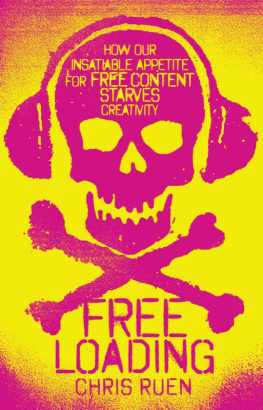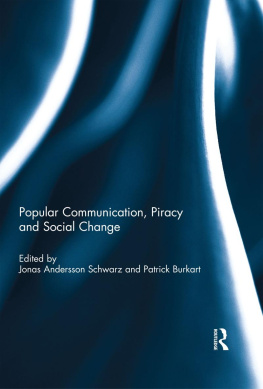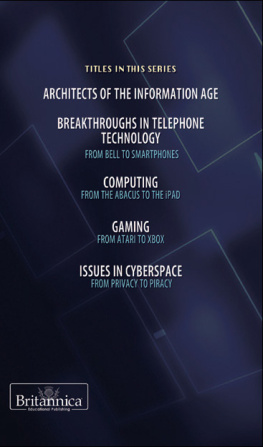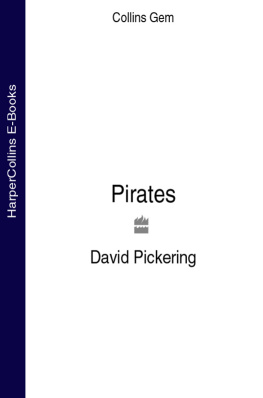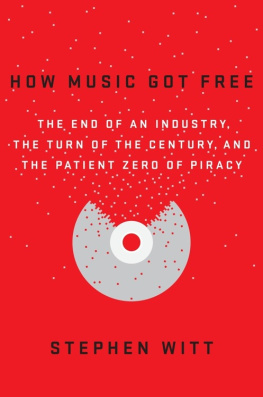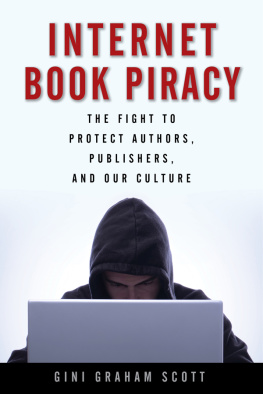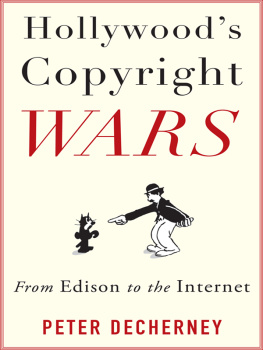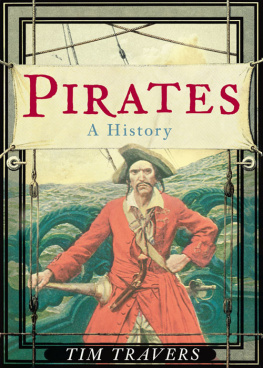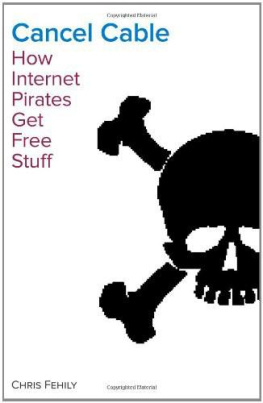
Scribe Publications
FREELOADING
Chris Ruen, a Brooklyn-based freelance writer whose work has appeared in The New York Times and Slate , is a former contributing editor for Cooleh magazine. He has covered music culture for Tiny Mix Tapes , a Minneapolis-based online music magazine.
Because of Emily
Scribe Publications Pty Ltd
1820 Edward St, Brunswick, Victoria, Australia 3056
Email: info@scribepub.com.au
First published in the United States by OR Books, New York and London, 2012
Published in Australia and New Zealand by Scribe 2013
Copyright Chris Ruen 2012
All rights reserved. Without limiting the rights under copyright reserved above, no part of this publication may be reproduced, stored in or introduced into a retrieval system, or transmitted, in any form or by any means (electronic, mechanical, photocopying, recording or otherwise) without the prior written permission of the publishers of this book.
National Library of Australia
Cataloguing-in-Publication data
Ruen, Chris.
Freeloading: how our insatiable appetite for free content starves creativity / Chris Ruen.
9781921942792 (e-book.)
1. Intellectual property. 2. Copyright and electronic data processing. 3. InternetLaw and legislation. 4. Creation (Literary, artistic, etc.)Law and legislation. 5. Open access publishing.
346.048
www.scribepublications.com.au
If we understand the revolutionary transformations caused by new media, we can anticipate and control them; but if we continue in our self-induced subliminal trance, we will be their slaves.
Marshall McLuhan
Contents
: The Future, On Repeat
: The Thicket
: Ground Clearing
: Restoration
Introduction
The Future, on Repeat
On a January morning in 2010, nervous congregants gathered in a San Francisco auditorium. They awaited revelation, if not rapture. Silicon Valleys far-flung diaspora joined the revival from afar, holding virtual vigil. With bent backs and glazed eyes, they stared at the live video feed streaming across their computer screens. Soon, the prophet of the information age would reward his followers and offer a new vision unto the people.
Inside the auditorium, eager eyes darted back and forth across the stage, straining to see their digital media savior. There he was! Applause thundered: dressed in his uniform of black turtleneck and blue jeans, Steve Jobs finally entered from stage left.
The oracle of Apple Inc. began to enumerate the many charms of his latest revelation: the iPad. The new tablet computer represented an entirely new category of digital device, splitting the difference between the smartphones elegant mobility and the laptops utilitarian power. Tablets took the totality of digital media consumption and made it truly mobile. Digital web browsing, email, photos, video, music, games, and books were hardly new, but having such an optimized, sleek, intuitive device with which to obtain and consume it all was revolutionary.
Let me show you what it looks like. I happen to have one right here, Jobs said.
Like a postmodern Moses declaring new holy law, he walked to the lip of the stage and held out the diminutive iPad for its first inspection by his followers. They gave thanks, hooting and whistling up to the stage. Jobs stepped back to detail the features of his new brainchild, highlighting its big, beautiful touchscreen.
Holding the Internet in your hands, he said. Its an incredible experience.
But now that the prophet had offered the ability to hold the past, present and future of human expression in our handswhat would we do with it: create or destroy?
By 2010, the new age of digital media had already presented difficulties for traditional creative industries. With the iPad adding to the mix, would magazines, newspapers, books, television, and film reap sustaining profits from digital metamorphosis? Some believed the industries themselves would be reaped, sacrificed to the gods of progress. But not David Carr, media columnist for the New York Times .
In a column entitled A Savior in the Form of a Tablet, Carr enthusiastically gushed: The tablet represents an opportunity to renew the romance between printed material and consumersomewhere between the iTunes model and the iPhone app store there may be a model for print. In an issue of Wired magazine dedicated to the emergence of tablets, editor-in-chief Chris Andersonotherwise an evangelist for free business modelsproclaimed the dawn of a new age for digitized media, one where tablets can show media in a context worth paying for. Rupert Murdoch temporarily suspended his battles against content aggregators and Google to call the iPad a wonderful thing If you have less newspapers and more of these it may well be the saving of the newspaper industry.
But would consumers actually be willing to open their wallets for content after years of getting much of it for free online? The gale-force winds of technological change had already blown many media professionals to the precipice. Now the iPad threatened to push them over the edge.
Once the Internet became ubiquitous in the 2000s, newsstand, subscription, and advertising revenue dropped steadily as consumers migrated to the web for free news, information, and classified listings. Total paid newspaper circulation sunk by six million from 2005 to 2008, and print advertising revenues deflated by a whopping $13 billiona contraction of nearly thirty percent. While newspapers searched for an emergency parachute to ease their free fall, online advertising revenues offered little more than a cocktail umbrella. By 2008, merely eight percent of newspaper advertising revenues came from online content. Publishers, accustomed to the analog dollars of print, struggled to make due with online advertisings digital pennies.
As if that were not ominous enough, in came the Great Recession of 2008.
Consumer budgets wilted. In the following year, overall print revenue dropped another twenty-eight percent. Even online ad revenues, modest but thought certain to grow, absorbed double-digit losses as total advertising revenue plummeted another $10 billion. Institutions of the news such as The San Francisco Chronicle and The Seattle Post-Intelligencer ceased printing. The New York Times , once thought invincible, became so cash-strapped that it took out a $250 million emergency loan from Mexican billionaire Carlos Slim, laid off employees, and axed sections. Magazine publisher Cond Nast shuttered historic titles and slashed its total budget by twenty-five percent in the face of sinking ad revenue.
Aside from optimists like David Carr, who had faith that new digital models would save us all, another school of thought emerged. Stewart Brands famous edict Information wants to be free was its guiding light. For these people, the notion that any industry needed to be saved was misguided and pathetic. Technology was not responsible for anything , much less the salvation of old, inefficient industries rendered useless by the market. If historic institutions failed, even ones as important to society as robust journalism, it was the underlying industries own fault for not adapting fast enough or for no longer serving a purpose in the eyes of the marketplace. Institutional death was a necessary cost of progress.
Technology giveth and technology taketh away, BoingBoing editor Cory Doctorow declared. Others in this unsentimental sect adopted a more condescending and altogether nasty attitude. In the issue of Wired magazine devoted to the iPad, the editors gave Fake Steve Jobs,a pseudonymous blogger well known in Silicon Valley, the last word on the iPads potential impact for print industries. His entry, Go Save Yourself, read:
Next page
